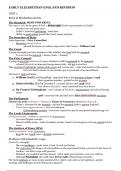EARLY ELIZABETHAN ENGLAND REVISION
UNIT 1:
Roles in Elizabethan Society
The Monarch: MOST POWERFUL
The right to rule ‘by the grace of God’ = divine right (God’s representative on Earth)
- Declared war and make peace
- Called + dismissed parliament - made laws
- Ability to grant/attaint grand titles, land, money and jobs
The Secretary of State:
[most important = Privy Councillor]
- Monarch’s closest advisor
Advised the Queen on matters important to the Crown = William Cecil
The Court:
A group of people [servants, members of the nobility] who lived with the monarch
- To entertain the monarch = dances, feasts + hunting
The Privy Council:
A group of powerful noblemen [19 men: minimise conflict] appointed by the monarch
Advised Elizabeth on domestic/foreign issues daily - did not control her
They monitored parliament, justices of the peace and oversaw law + order and security of the country
Elizabeth had to ensure no one member got too powerful or became disloyal
Elizabeth’s main advisors:
1. William Cecil [Lord Burghley] - appointed him as the Secretary of State in 1558
Most important minister - guided her for 40 years
2. Robert Dudley [Earl of Leicester] - a trusted advisor until 1558 (died)
Very close to Elizabeth - many rumoured they were lovers
3. Sir Francis Walsingham - was in charge of Elizabeth’s secret service and advised foreign
affairs
1586 - uncovered the plot that led to Mary, Queen of Scots’ execution
The Parliament:
[House of Lords (noblemen + bishops) + House of Commons (chosen via election)]
- Called + dismissed by the monarch - advised the monarch [help to govern England]
- Passed laws/approved taxes = Acts of Parliament
Extraordinary taxation - extra taxes required to pay for unexpected expenses e.g. war
The Lords Lieutenants:
Local government - noblemen, appointed by government
- Governed English counties
- Raised a militia [army - made of ordinary people, raised in an emergency] to keep control in local
areas
The Justices of Peace [JPs];
Local government - large landowners
- Kept the law, heard cases + decided punishments
Problems with Elizabeth’s reign
Elizabeth’s strengths:
- She was intelligent - spoke Latin, Greek, French and Italian
- She understood the dangers of court politics, as she experienced being a prisoner in the Tower of
London - was able to cope with pressure
- Elizabeth was confident and charismatic - often made great speeches, won over subjects
- Although Protestant, she could claim divine right with growing conviction
She faced problems, as many people questioned her right to rule such as: her legitimacy, gender,
marriage and challenges at home [financial weakness]
, ● Legitimacy
[whether a monarch is lawfully entitled to rule - parents must be legally married]
Roman Catholics: questioned her legitimacy as Elizabeth’s parents (Henry VIII + Anne
Boleyn’s marriage = not legal)
Henry VIII had divorced Catherine of Aragon in order to marry Anne
The Pope refused to recognise their divorce
Anne Boleyn = executed in 1536 - Henry excluded Elizabeth from the line of
succession, HOWEVER he reversed this decision before his death
This was a considerable challenge to Elizabeth as lots of Catholics questioned her right to be
on the throne.
● Gender and Marriage
Elizabeth was a young woman [21 years old] and lacked experience. - a Queen ruling in their own
right was very unusual in the 16th century
- Needed support and advice from her Privy Council + Secretary of State: William Cecil
Many feared that a female ruler would mean that England was seen as weak.
France and Spain were the most powerful nations, both ruled by kings
Christian religion: taught that women were inferior to men, as they had to lead their
army into battle
Elizabeth was also unmarried = unaccepted as Christian traditions suggested that women
should follow men’s authority
Many disapproved the idea of a Queen reagent - a Queen who actually ruled
Advantages of marrying:
- Husband would fulfil the role of military leader
- Having children will help England’s stability - secure the line of succession = no “vacancy”
for heir
Disadvantages of marrying:
- Prince/King were the only suitable rank to marry - husband becomes more important
England would become 2nd to husbands country - people were worried a foreign prince
would take control over them
- If Elizabeth married a Protestant, it would anger Catholics
- If Elizabeth married a Catholic, it would upset the Protestants
- Marriage could involve England in expensive wars, damaging royal finances and requiring
taxation [Crown was already £300,000 in debt]
HOWEVER, marriage was important, as Elizabeth needed an heir, because if she died without an
heir, the throne would be vacant and could lead to a civil war.
This was a considerable challenge to Elizabeth as the future of England was uncertain.
● Financial weaknesses
Elizabeth’s sister, Mary, had left debts of £250,000 - £300.000
The Crown [government, the monarch and her advisers (Privy Councillors)] was in debt
£300,000 and had an annual income of only £286,667.
Elizabeth needed money to remain secure on the throne, as she could use it to reward her
supporters. - since 1540s the Crown devalued the coinage, by reducing its silver and gold content
= resulted in inflation, as the value of currency fell
Elizabeth came up with ways to raise money without Parliament:
- Rent from their own lands
- ‘Forced’ loans - compulsory and never repaid
- Special additional taxes - “subsidies”, had to be agreed by Parliament
Elizabeth’s government did not have much money as: they had fought a costly war with France,
and Mary had sold off a lot of land - so the income from rents fell, so Elizabeth:
1. Saved her own income and cut her household expenses by half
2. Sold Crowns land worth £120,000
By 1574, the Crown was out of debt for the first time since 1558.
This was a minimal challenge to Elizabeth as it was a problem, but it was solved quickly.





